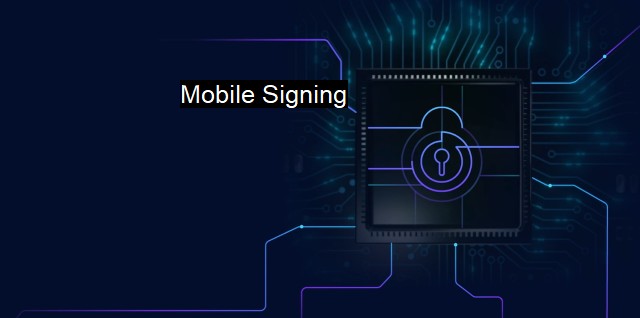What is Mobile Signing?
Mobile Signing: Securing Transactions and Protecting Against Cyber Threats
Mobile signing is a key component in the domain of cybersecurity and antivirus, especially with the elevated demand for effective data security worldwide. As the digital landscape continues to evolve, mobile signing has quickly emerged as an indispensable tool for securing mobile devices and data communication.Mobile signing, often interchangeably used with "Device Signing", is a process of guaranteeing the authenticity and verifying the integrity of applications downloaded on mobile phones. It puts a digital signature on the applications, documents or software that confirms they're trustworthy. The mobile device uses the digital signatures to recognize programs and documents as safe, consequently enabling its users to interact securely with the content.
From a cybersecurity standpoint, mobile signing is a necessity in the fight against various types of unidentifiable threats, such as malware and viruses. By confirming the source of applications or any software in mobile devices, it helps prevent unauthorized or untrusted entities from breaching security protocols.
Critical to mobile signing are public and private keys used in the digital signature algorithm. The private key is kept secret by the sender who uses it to sign the data. The public key, freely available, is used by the recipient to verify the signature. the bulky part of data protection lies in the robustness of these cryptographic keys.
Mobile signing is linked to antivirus technology since it can help strengthen security measures against malicious or infected applications. With mobile signing, all received data goes through scrutiny for malware-infected documents or harmful applications. Consequently, mobile devices get alarms on malware presence before any damage transpires. Hence, it doubles as an external sentry and an internal antivirus protector.
The digital signature on mobile apps thermostats an additional gatekeeper for user privacy. Through mobile signing, users are assured that even if their device gets compromised, the confidential information within an application remains distorted hence safeguarding the privacy.
Mobile signing also ensures the integrity of mobile communication. It offers confidence that data sent across networks will reach its intended target without being blocked or altered. Any attempt to change a signed application or tampering with the message would break the signature. Therefore, when a recipient verifies the signature and it proves valid – the data integrity remains intact.
Unquestionably, application developers find mobile signing extremely significant. They sign their apps using a unique key, effectively preventing any unauthorized changes to the app once it has been published. This protects not only the users but also the integrity of their offerings.
As effective as mobile signing is, it isn't a catch-all solution. Developers and consumers must employ a multifaceted approach to data security that includes strong passwords, secure coding practices, and being cautious with the data they share online.
Mobile signing is a fundamental element in an extensive physical and cognitive matrix of cybersecurity protocols. By implementing digital signatures, it assures users of the authenticity and integrity of downloaded applications and alerts them to any potentially harmful elements. Coupled with other protective mechanisms, mobile signing is remarkably pivotal in enabling a secure digital space. As we surge further into the era of digital transformation, the pertinence of mobile signing in protecting soft and hard digital infrastructures will only be exacerbated.

Mobile Signing FAQs
What is mobile signing?
Mobile signing is a cybersecurity feature that allows for secure digital transactions, such as signing online documents, using a mobile device. This is achieved through the use of encryption and other secure technologies.What is the importance of mobile signing in antivirus software?
Mobile signing is important in antivirus software because it ensures that the software is authentic and has not been compromised by malware. This helps to prevent hackers from stealing sensitive information from the device, as well as from using the device as a platform for launching attacks against other devices.How does mobile signing provide a secure transaction environment?
Mobile signing provides a secure transaction environment by using digital certificates to verify the identity of the parties involved in the transaction. These certificates are issued by trusted third parties, and are used to encrypt the transaction data to prevent unauthorized access. This ensures that the transaction is secure and cannot be tampered with or intercepted by hackers.Is mobile signing available on all mobile devices?
Yes, mobile signing is available on most modern mobile devices, including smartphones and tablets. However, it may be necessary to enable the feature in the device settings, or to download a specific app that supports mobile signing. It is important to ensure that the device is running the latest version of the operating system, and that all recommended security updates have been installed.| | A | | | B | | | C | | | D | | | E | | | F | | | G | | | H | | | I | | | J | | | K | | | L | | | M | |
| | N | | | O | | | P | | | Q | | | R | | | S | | | T | | | U | | | V | | | W | | | X | | | Y | | | Z | |
| | 1 | | | 2 | | | 3 | | | 4 | | | 7 | | | 8 | | |||||||